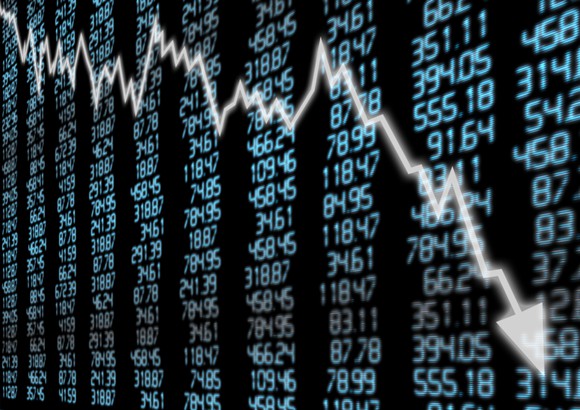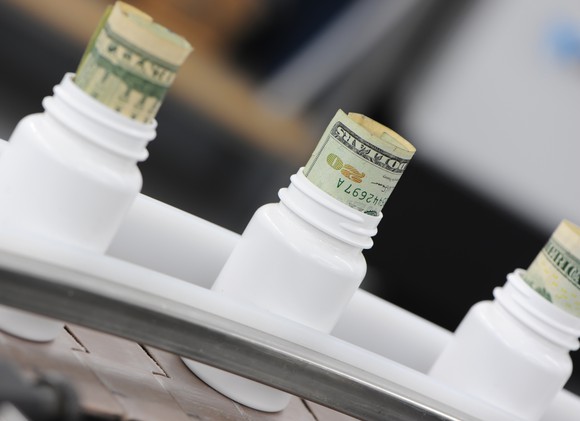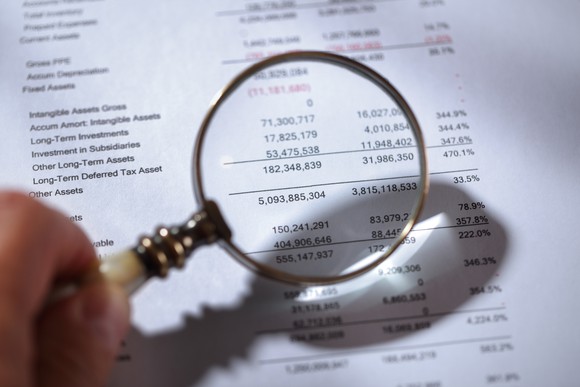The tables have turned pretty quickly for Israeli-based branded- and generic-drug developer Teva Pharmaceutical Industries (NYSE:TEVA). In July 2015, shares of the company were trading north of $72, an all-time high. Today, Teva's stock is struggling to hang onto the $30 mark, which is a more than 10-year low for the company.
Teva Pharmaceutical's downfall, explained
What went so terribly wrong over the course of less than two years?

IMAGE SOURCE: GETTY IMAGES.
To begin with, Teva acquired generic drug developer Actavis from Allergan (NYSE:AGN) at what, in hindsight, proved to be a really bad time. Teva paid $40.5 billion in a cash-and-stock deal to buy Actavis and become the largest generic drugmaker in the world. Unfortunately, generic drug pricing power has stalled in recent quarters. Meanwhile, Teva's debt load has burdened the company. As of its latest quarter, Teva had less than $2 billion in cash and cash equivalents and nearly $36 billion in debt. Large debt loads tend to worry investors (see Valeant Pharmaceuticals (NYSE:VRX) if you need any confirmation), and they've played a key role in pushing Teva's share price lower.
Internal turmoil has also been an issue. In December, Teva agreed to pay a $519 million settlement to U.S. regulators after it admitted to paying bribes to government officials in Russia, Mexico, and Ukraine in order to boost the sale of its products. More recently, Teva's CEO Erez Vigodman stepped down following the bribery settlement, and word surfaced this past week that the company's CFO is also on his way out.
The third and final major issue for Teva has been the ongoing fight to keep generic versions of multiple sclerosis (MS) drug Copaxone off the market. Copaxone generates a good chunk of Teva's profits since it's a high-margin branded drug, but it's also at the end of its patent protection period. Teva reformulated the once-daily injection into a new three-times-weekly injection, which is more convenient for the patient and more importantly allowed Teva to argue for longer patent protection. Yet in late January, a U.S. court invalidated those reformulated patents protecting Copaxone, worrying investors that generics could soon flood the market.

IMAGE SOURCE: GETTY IMAGES.
Teva is looking to deal
However, Wednesday, April 26, saw a reversal of fortune, with investors bidding the stock up nearly 2% after Bloomberg reported that Teva may be looking to sell its cancer products division, according to anonymous sources.
In 2016, according to the company's full-year report issued in mid-February, oncology sales totaled $1.14 billion, led by Treanda/Bendeka with $661 million in annual sales. But competition among blood-cancer drugs is increasing, which has weighed on Teva's branded oncology products. Last year, sales of oncology products dipped 5% from $1.2 billion in 2015, with Treanda/Bendeka sales falling 11%. With Teva focused on promoting Copaxone, a $4.2-billion-annual drug, as well as its leading generic-drug portfolio, it could make sense to sell a waning oncology drug portfolio.
Why is now the right time?
For one, it would allow Teva to immediately reduce its debt and ease some of the concerns of Wall Street and perhaps even its lenders. It's unclear what Teva's oncology segment would fetch without knowing the specific earnings before interest, taxes, depreciation, and amortization (EBITDA) of these products, but with acquisitions regularly occurring in the biotech arena for three or more times sales, I'd expect anywhere from $3.5 billion to as high as $5 billon to be the asking price. This would eliminate 10% or more of Teva's outstanding debt.

IMAGE SOURCE: GETTY IMAGES.
It's also worth considering the sale because oncology drugs still possess strong pricing power. A potential suitor that specializes in oncology medicines would likely be able to put more effort into growing Treanda's sales volume and lift its list price.
Also, with President Trump likely far too busy with healthcare and tax reform to deal with drug-price reform, a suitor could acquire Teva's cancer-drug portfolio with the expectation that it would have pretty substantial pricing power. Oncology drugs are an excellent carrot to dangle if a company is looking to reduce debt. If Valeant Pharmaceuticals could get $820 million for Dendreon's assets (which was essentially for a disappointing late-stage prostate cancer treatment known as Provenge), Teva should be able to get more than three times annual sales for its oncology assets, if not more.
It's worth noting that there are no guarantees Teva winds up selling its oncology drug division at this point. Yet, given its debt load, looking to make a deal certainly makes sense.
Teva may not be in as dire shape as you think
Should Teva play a game of Let's Make A Deal and divest its oncology assets, Wall Street and investors may realize that the company isn't in as dire shape as its sharp stock decline would appear to indicate.

IMAGE SOURCE: GETTY IMAGES.
For example, the company's acquisition of Actavis is expected to eliminate a number of business redundancies and result in $1.4 billion in annual cost savings by 2019. Also, simply adding Actavis' generic-drug portfolio to its own and becoming the largest generic-drug maker in the world should come with perks in the form of better pricing power with insurers. Even with generic-drug prices weakening in recent quarters, Teva should be able to hold up better given its portfolio diversity and generic market share.
Teva has also done an admirable job of transitioning its patients and physicians over to its new extended-release Copaxone formulation for MS. Teva will clearly not be able to fend off generic competition forever, but it's done more than enough through the legal process and via the reformulation to encourage physicians and patients to stick with a brand-name product they've trusted for years.
Today, Teva is valued at less than seven times Wall Street's profit projections for 2018 and less than five times its trailing-12-month EBITDA, and it sports a 3.7% dividend yield. This is why I've been nibbling on shares of the company in my personal portfolio in recent months, and would certainly suggest investors give this Israeli drug giant a closer look.









